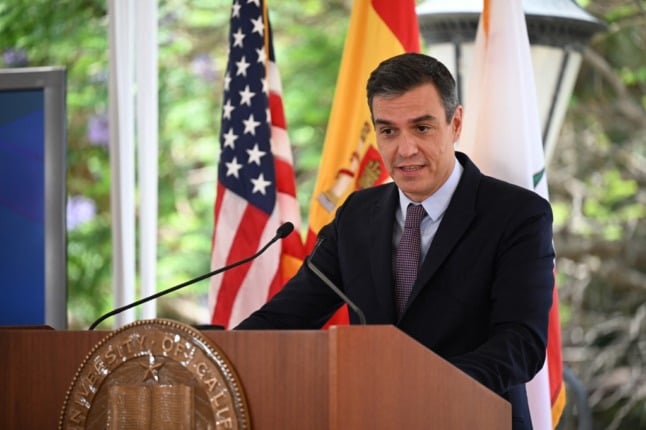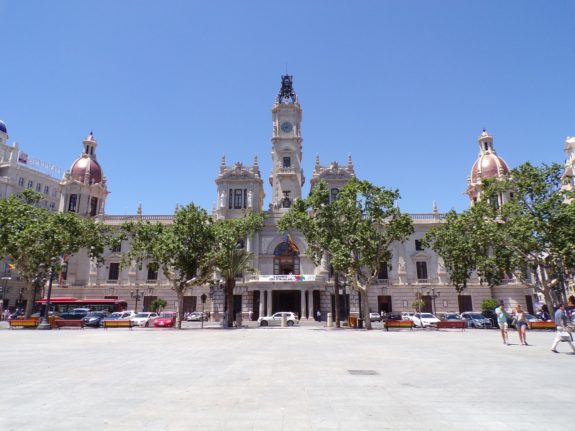“We aim to become, and we have been named in some media, and if you allow the comparison, the Hollywood of Europe,” Pedro Sánchez told guests at a meeting with American audiovisual giants in Los Angeles on Thursday.
“Numerous providers of cross-border TV channels that were established in the UK before Brexit have now moved their operations to Spain,” the Spanish Prime Minister explained.
“Among them our hosts today NBC Universal, Sony, Disney, just to name a few.
“Spain has all the necessary administrative and tax incentives, as well as all possible landscapes and backdrops to receive new projects and create new narratives.
Sánchez presenta su proyecto para convertir a España en "el Hollywood de Europa" en un encuentro en Los Ángeles con los gigantes de la industria audiovisual estadounidense pic.twitter.com/FWlBeuZGM7
— EL MUNDO (@elmundoes) July 23, 2021
Does Spain do enough to convince Hollywood?
Spain has been the movie set of numerous film classics such as Indiana Jones, Star Wars and more recently hugely popular franchise productions including Fast and the Furious and Game of Thrones.
But Spain is also reported to have lost out on several big Hollywood shoots due to its slow and complex bureaucratic processes, for example not issuing visas quickly enough for film crew members who are American or from another non-EU country.
In some cases, actors, makeup artists, producers and other film crew had to be able to prove they had three years of experience, have a recognised degree or show they had a contract longer than three months with the audiovisual company to be eligible for a visa.

A scene from Star Wars: Episode II – Attack of the Clones, shot in Seville’s Plaza de España. Photo: Screenshot
Slowly but surely, Spain is realising how its outdated and convoluted official processes and strict requirements for foreigners do not correspond with the reality and demands of a fast-paced international job market, especially for an industry as demanding as Hollywood’s.
During his meeting with the US’s top studios, Sánchez outlined his government’s plans to allocate €1.6 billion ($1.88 billion) to boost Spain’s audiovisual sector, including tax incentives for international production houses that relocate to Spain.
If carried out in practice, this would mean Spain’s audiovisual industry would grow by 30 percent in the next four years.
In early July, Spain’s Migrations Department also sent instructions to simplify and fastrack the granting of permits and visas for all workers who come to Spain to shoot series, movies or advertisements.
Will all this be enough to convince Hollywood to turn to Spain?
If recent reports are anything to go on, Greece is currently the European country that’s garnering the attention of big-money American productions.
After the 2016 Jason Bourne was shot in Spain’s Canary Islands when the film was set in Athens – all in the name of tax deductions – the Greek government reacted by introducing a law to attract international productions with a tax rebate of 40 percent on all manner of expenses.
As a result, more than 70 major international productions have chosen the Hellenic nation, pumping millions into the Greek economy.
It seems Spain is late to the party, but it’s still a worthy competitor, as the Game of Thrones prequel “House of the Dragon” (shooting in Spain in autumn) suggests.
How important is Hollywood to Spain’s economy?
According to data from Spain’s Secretary of State, one of the world’s leading production companies will invest almost €362 million in the filming of scenes from 33 series and 18 films in the Canary Islands, Andalusia, Madrid, Aragon, Catalonia, Navarra, the Balearic Islands and Valencia.
So there’s certainly the potential for big cash injections into the Spanish economy, although as seen in Greece in recent productions, jobs don’t always go to locals as fast-tracked visas means Hollywood directors bring more of their own crew over.
Around 668,000 people in Spain work in the film, video, radio and TV industry, according to 2020 data by the country’s Ministry of Culture, a sector that’s among the hardest hit in Spain as a result of the pandemic.
That’s not counting the catering, transport and other businesses that make money indirectly from multimillion-dollar productions.
Between 2015 and 2018, Spain ranked fifth in the European Union in content creation, at the same level as Italy and Sweden, but behind the United Kingdom, Germany, France and the Netherlands.
The entertainment industry also has the potential to boost tourism as has happened in the Basque Country thanks to Game of Thrones.
But the reaction by the majority of Spaniards has been of frustration with Pedro Sánchez’s ‘Hollywood’ allusion, for whom the focus should be on fixing local work issues without having to promote Spain abroad.
READ ALSO:



 Please whitelist us to continue reading.
Please whitelist us to continue reading.
Member comments